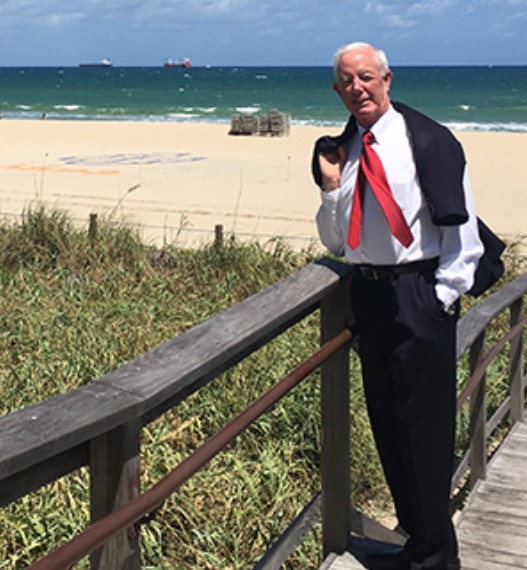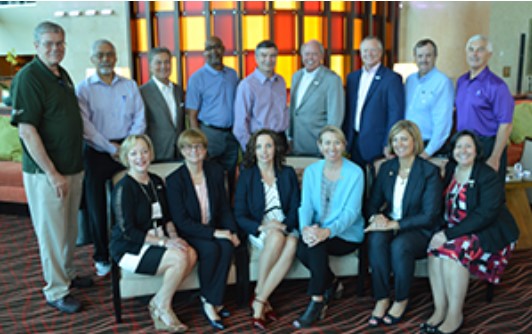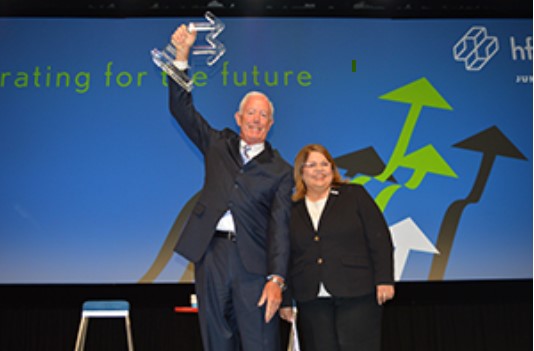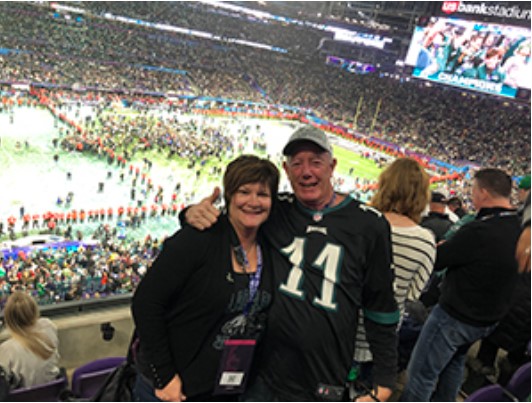Incoming HFMA Chair Calls on Finance Leaders to ‘Imagine Tomorrow’ to Improve Care Delivery and Accessibility Today
Imagine a time when everyone has access to care when they need it and where health care is more affordable and is delivered consistently, safely, reliably, and always following best practices.

This vision represents health care’s greatest challenges and opportunities, says Kevin Brennan, CPA, HFMA’s 2018-2019 Board Chair. After 23 years as executive vice president and CFO for Geisinger in Danville, Pa., Brennan will be retiring on June 30, 2018, but he will continue in the industry as a Principal with Harrisburg, Pa.-based SunStone Consulting, a firm that assists clients throughout the country with reimbursement, regulatory, revenue integrity, and strategic solutions.
As Brennan assumes the role of HFMA Chair this month during HFMA’s Annual Conference, being held June 24-27 in Las Vegas, he will lead the 37,000-member association during another year of transformative change. His theme: “Imagine Tomorrow.”
In an interview with hfm, Brennan talked about his goals for his year as HFMA Chair, his career at Geisinger, his family, the power of teamwork, and the need for innovations in care and business processes.
Emphasis on Innovation
“I am a big believer in the benefits of innovation,” Brennan says. Healthcare leaders must take risks that are focused on improving care delivery while achieving better outcomes and lower costs.
In 2016, Geisinger launched an innovative concept called ProvenExperience that granted refunds to patients who were dissatisfied with their care. The goal of the initiative was to remedy service gaps in the patient and member experiences through process improvements and to make amends for shortcomings in customer or clinical services. As part of the program, Geisinger coupled the initiative with an app that facilitates requests for discounts on self-pay balances. The Washington Post described this program as “the most unexpected hospital billing development ever.”
Geisinger’s portfolio of ProvenCare models essentially represent a commitment to consistent, safe, and reliable best practices, often requiring innovations in care delivery and collaboration among many disciplines. “Reengineering of care has represented a great opportunity to eliminate unjustified variations while increasing quality, reducing costs, and improving the patient experience,” Brennan says.
Imagine tomorrow, Brennan poses, where longitudinal health data are linked with genetic sequenced data, leading to innovations in patient care processes. Geisinger’s MyCode initiative is one such endeavor for us to watch and emulate. Mining the robust data stored in our electronic health record with advances in science and leveraging our data analytic capabilities are steps to creating an exciting opportunity for us to improve care to individuals, families, and entire communities.
While today’s healthcare environment is experimenting with everything from new payment models to innovative technological tools, one of the challenges we face is in scaling our innovations more broadly for more rapid adoption and gaining a return on investment. “Many times, organizations are finding the rapidity of change an impediment to adoption,” Brennan says. “Some of the innovations that were identified and discussed five or six years ago are still relevant today—for example, patient transparency and chronic disease best practices.”
Although technological innovations in clinical care often attract headlines, the administrative innovations also have a tremendous impact on the ability to create new efficiencies and better use of analytics. Brennan believes HFMA members serve a tremendously important role in improving health care today and in the future.
To that end, he encourages healthcare finance professionals to take time to “imagine tomorrow.”
“I hope that folks are confident, hopeful, and optimistic, believing that we can all do more by working together and using the innovative spirit of America to design a system of care that provides greater access, delivers more reliable best practices, and does it in a way that is more affordable,” Brennan says.
“Improving health care long term will require hard work and team collaboration,” Brennan says. “The innovations that HFMA members envision for their organizations should be shared and tested with internal and external teams. In doing so, together, we can make health care better for ourselves, our organizations, and for our communities.”
A Career Taking Shape
Growing up in a row house in Philadelphia with Irish immigrant parents, Brennan witnessed firsthand the importance of having a strong work ethic and in preparing for one’s future.
For Brennan, it was his older brother who influenced his decision to major in accounting at LaSalle University in Philadelphia. Upon graduation, Brennan accepted a job with the Pennsylvania Department of the Auditor General, focusing on healthcare cost report auditing.
“Entrusted with significant audit responsibilities at a young age, all of which counted as qualifying experience for becoming a CPA, was a great way to start my career,” he says. After just a few years in the field, Brennan was promoted and given the opportunity to manage 30 auditors over a territory covering one quarter of Pennsylvania.

Having become a CPA, Brennan pursued a professional goal and accepted a position as assistant controller at the prestigious Children’s Hospital of Philadelphia. “It was a great opportunity to build on my reimbursement experience, develop cost accounting skills, and learn the operating intricacies of an academic health and research organization.”
“Cost reimbursement was the dominant method used in 1980, and becoming proficient with these skills was the secret to unlocking a career in financial management of healthcare organizations,” he says. “However, I came to believe that cost reimbursement was doomed, so I took a major risk and pursued a ‘better tomorrow’ at an organization across the river—Saint Michael’s Medical Center in Newark, New Jersey.”
The year was 1981, and it was Brennan’s first position as CFO. There, he had the rare opportunity to work on a new experimental all-payer reimbursement system that not only paid for a group of relevant services with a single payment (known as DRGs), but also included coverage for bad debts and charity care. It was an enormous challenge, but with the help of HFMA resources, Brennan was able to tackle the challenges with timely education, resources, and a forum to connect with others facing similar challenges. “Little did I know that three years later the federal government would adopt this model as the national reimbursement model, which continues to be used today,” he says. “It was an all-payer experiment that lasted into the 1990s.”
Brennan’s work at Saint Michael’s helped form his core belief in access for all and in a uniform approach to spreading the burden of uncompensated care across all payers. “This approach served as a ‘safety net’ for providers that may have otherwise gone out of business,” he explained.
The burden of uncompensated care continues to be relevant in a wider national discussion about the unevenness of access to care between inner cities and suburban America. “In today’s world, we have expanded Medicaid and initiated the Affordable Care Act, but we still have very few systems in the United States to try to deal with uncompensated care,” Brennan says. “This will continue to be a topic in our national healthcare agenda.”
Brennan moved to Geisinger in 1995. It was a $500 million organization at that time, and has grown to a $7 billion health system today, employing some 30,000 employees. Brennan will retire from Geisinger on June 30, 2018, after 23 years of service. He is the longest-serving CFO in Geisinger’s 103-year history. As he contemplated his responsibilities as Chair of HFMA, and reflected on his lifelong professional relationships, he chose to join SunStone Consulting on July 1, 2018, a firm with great experience and similar core values.

“I am really proud of the teams that I have worked with over the years,” Brennan says. “Together, we worked collaboratively, and I am honored to share in all our organizational accomplishments and in our growth and financial success, despite challenging times.”
Brennan’s innovative drive is focused on one core premise: Fundamentally, he wants to help reengineer healthcare delivery. It is a notion formed from his professional and personal experiences.
“When one of my grandchildren experienced an extended NICU stay and multiple surgeries, I witnessed the best medicine has to offer,” says Brennan. “But at the same time, I experienced this nagging uncertainty and questions about the overall care processes. I also reflected on my own leadership decision making about equipment replacement, staffing patterns, training, and team-based care practices. Suffice to say, we know all our organizations have ample opportunities to do better. That’s why it’s so important that we ‘Imagine Tomorrow,’ where our care coordination is better, where our science improves, where the technology advances, and where all our processes work together seamlessly to create a better patient experience.”
The Power of HFMA
Brennan’s personal and professional vision influenced his theme as HFMA Chair. “HFMA members have an opportunity to influence and facilitate great change in health care,” he says. “Additionally, HFMA has the opportunity to share and honor best practices and innovation and to create a rich network to help facilitate career and knowledge growth for healthcare finance professionals—from those who are just starting their career in healthcare finance to those who are more experienced.”
HFMA has been part of Brennan’s journey for nearly his entire career. He joined in 1981 after an invitation to speak at one of the chapter events. Because of his broad work locations, he became active at various chapter events in both Pennsylvania and New Jersey. The affiliation gave Brennan an opportunity to give back to his profession by leading discussions and committee meetings and volunteering on membership activity committees.
Brennan’s work with HFMA at the national level grew from being a sponsor of the Patient Friendly Billing Task Force, which then led to another key HFMA initiative called the Price Transparency Task Force. He was also a member of HFMA’s Large System CFO Council and served on the Principles and Practices Board.
Under Brennan’s leadership, Geisinger has won the HFMA MAP Award 11 times—the only organization to earn this distinction every year since its inception. “It is just phenomenal, an independent recognition demonstrating that while Geisinger is an organization known for its clinical innovations, we are just as proud of and focused on the successes we can achieve relative to our administrative innovations,” he says.
“At Geisinger, we encouraged innovative approaches in the revenue cycle area with support for transparency, automation, standardization, and consumer engagement, but most of all, team-based best practices,” he says. “We believed that these were all areas that state-of-the-art, large health systems should be committed to doing.”

Brennan believes HFMA needs to showcase and honor such innovative professionals and organizations. It not only shows other members what can be done, but also offers guidance on how to emulate and scale such efforts.
“A dozen years ago when we started HFMA’s Patient Friendly Billing Task Force, we knew there was nothing ‘friendly’ about billing practices,” Brennan says. “It is my hope that we will continue the quest to continually improve our patient communications, promoting engagement and transparency in the process,” he says.
Brennan concludes: “HFMA has played a pivotal role several times during my career, providing timely, relevant education during times of major change in the industry. Consequently, I have always encouraged my team to pursue education and credentials, demonstrating their professional proficiency. HFMA certifications were a differentiator and an important consideration in hiring and promotional decisions. I always felt certifications spoke volumes… and obviously the credential was an independent validation of their professional competency.”





